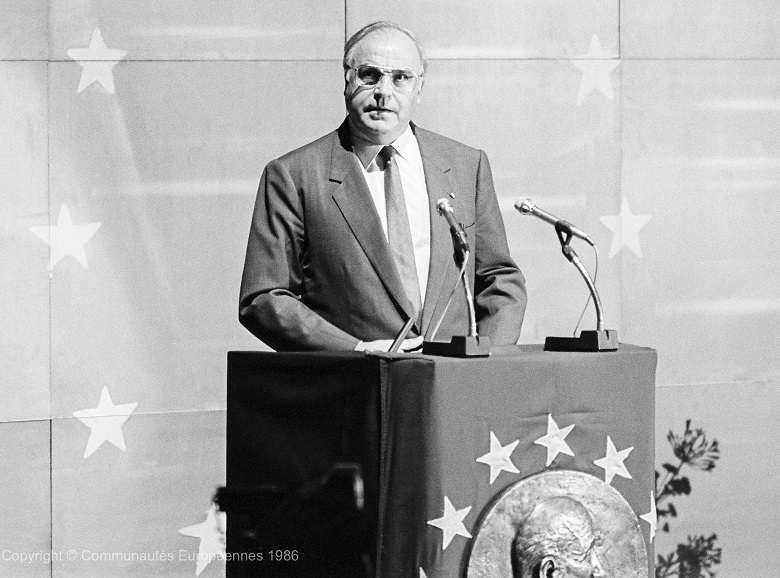We owe the creation of the euro as the EU’s single currency to this former German Chancellor…
As with Stefan Zweig and the Zweig Building, it was not until fairly recently that one of Parliament’s buildings was named for Helmut Kohl. Yet his name is much more readily associated with Europe than Zweig’s. In February 2019, the Square de Meeûs (formerly SQM) building in Brussels was renamed after the former German Chancellor, who led the reunification of Germany and championed the creation of the euro as the single European currency.
‘Chancellor of Unity’
Born in 1930, Helmut Kohl was Germany’s leader from 1982 to 1998. Like Zweig, Kohl was convinced that Europe could follow the American pattern and become one federation made up of member states: the United States of Europe. A vision he shared too for his own country, as he also advocated the reunification of Germany after the collapse of East Germany’s communist government. His fight for this earned him the soubriquet of the ‘Chancellor of Unity’. Kohl always liked to say, repeatedly, in connection with this, that European integration would come into its own with the reunification of Germany.
Unfortunately the popularity he enjoyed as a result of his role in the reunification did not last long, owing to all the problems that arose shortly thereafter: Germany was hit by recession and the measures taken by the government to curb rising unemployment were largely ineffective, causing his reputation to suffer heavily. However nothing could take away his status as the father of reunification, and he was well-liked by all his peers. When his death was announced, Parliament’s former President Antonio Tajani said that ‘Helmut Kohl was a visionary and a statesman who fought for reconciliation and unity among the people of Europe’.
 Chancellor Helmut Kohl at the gala evening to commemorate the 100th anniversary of the birth of Robert Schuman, one of the Founding Fathers of the European Union © European Communities 1986
Chancellor Helmut Kohl at the gala evening to commemorate the 100th anniversary of the birth of Robert Schuman, one of the Founding Fathers of the European Union © European Communities 1986
Father of the euro
Strongly pro-European from a very young age, he would go on to play a part in the introduction of the Single European Act (which advocated the free movement of goods, services, people and capital within the European Community), the setting up of the Schengen area created at the time of the Schengen Agreements signed in 1985, and the Maastricht Treaty in 1992, which established the European Union. Together with François Mitterrand, he formed one of the most symbolic of all the Franco-German duos.
But he is remembered particularly as one of the founding fathers of the euro, which he succeeded in ‘selling’ to a German population that had always been very attached to the mark, a symbol of their country’s power. Kohl was convinced that monetary union would lead to the political union of Europe.
He was also strongly in favour of central and eastern European countries joining the EU and of the European Parliament’s role being strengthened.
Helmut Kohl was made an ‘Honorary Citizen of Europe’ in December 1998 by the Vienna European Council. This is one of the EU’s highest honorary awards, granted as it is in the name of the whole of the European Union in recognition of the contribution made by key figures to ensuring European integration is a success. The only other people so honoured to date are Jean Monnet, in 1976, and Jacques Delors, in 2015.
On 1 July 2017 a European ceremony in honour of Helmut Kohl, who had died on 16 June, was held at the European Parliament in Strasbourg.